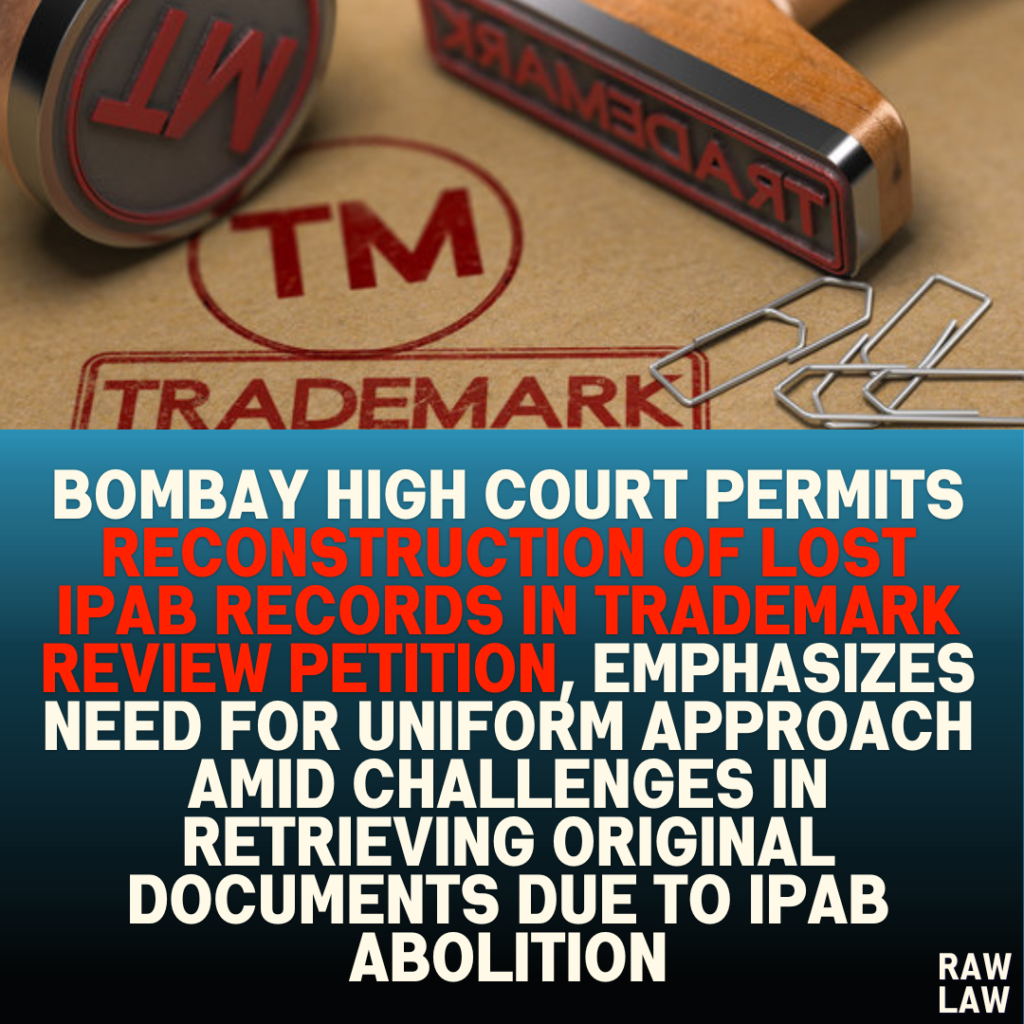Court’s Decision:
The Bombay High Court allowed the reconstruction of the record for the review petition filed by the petitioner in the Commercial Division of the High Court. The court permitted this on the basis that the original records could not be traced following the abolition of the Intellectual Property Appellate Board (IPAB). The Court granted relief as sought in the petition and directed that a reconstructed record be accepted for processing without awaiting the original documents.
Facts:
The petitioner filed a review petition under the rules of the Intellectual Property Appellate Board (IPAB) Procedure, 2003, challenging the cancellation of a registered trademark. After the IPAB was abolished, the petitioner sought the transfer of the records and proceedings of this review petition to the Commercial Division of the Bombay High Court. The original writ petition seeking this transfer was disposed of on March 7, 2024, with specific directions for the respondent to forward the papers and proceedings from the IPAB to the High Court.
Despite these orders, the original documents had not been transferred by the respondents due to the difficulties faced in tracing the records after the IPAB’s abolition in 2021. Consequently, the petitioner approached the court through the present interim application for permission to reconstruct the records using available copies.
Issues:
- Whether the High Court could permit the reconstruction of records for a review petition previously filed before the IPAB, given the non-availability of the original documents after the abolition of the IPAB.
- What procedure should be followed when original documents cannot be retrieved due to administrative or systemic changes?
Petitioner’s Arguments:
The petitioner argued that despite the High Court’s order directing the respondent to transfer the records, the documents had not been made available. This had resulted in an administrative deadlock, preventing the review petition from being heard. The petitioner requested the court to allow them to proceed with reconstructed documents to avoid further delays in adjudication.
Respondent’s Arguments:
The Union of India, representing the respondents, submitted that locating the original records was almost impossible due to the IPAB’s abolition in 2021. They argued that reconstructing the records was the only feasible solution to allow the matter to proceed.
Analysis of the Law:
The court analyzed Rule 23(1) of the IPAB (Procedure) Rules, 2003, which provided for the transfer of records from the IPAB to the High Court. The Court also considered the implications of Section 531 of the BNSS, 2023, which governs the continuation of proceedings under the new legal framework post-IPAB abolition. It noted that the procedural gaps created by the administrative changes should not prevent the resolution of pending cases.
Precedent Analysis:
The court referred to the principle established in previous cases where reconstructed records were accepted when original documents were lost or irretrievable due to reasons beyond the control of the parties. Such precedents support the principle that legal proceedings should not be hindered by administrative failures, especially in cases involving the transfer of records from abolished bodies.
Court’s Reasoning:
The court noted that since the abolition of the IPAB, similar situations could arise in other pending proceedings. The failure to locate the original records should not prejudice the petitioner’s right to have their case heard. By allowing the reconstruction of the record, the court sought to ensure that procedural issues do not obstruct substantive justice.
The court also emphasized that its ruling should serve as guidance for other pending matters impacted by the same issue, ensuring a uniform approach in handling cases where records could not be transferred from the IPAB.
Conclusion:
The Bombay High Court allowed the interim application, granting permission to reconstruct the records using available copies. It directed the registry to process the reconstructed review petition without insisting on the original documents. The court clarified that if the reconstruction of records is not possible in similar cases, fresh proceedings should be initiated before the Commercial Division of the High Court.
Implications:
This decision sets a significant precedent for cases affected by the administrative gaps caused by the IPAB’s abolition. It provides clarity on handling procedural complications in the absence of original records and ensures that parties are not denied justice due to systemic changes. The ruling is expected to streamline the resolution of several pending IPAB-related matters now before the High Court.
